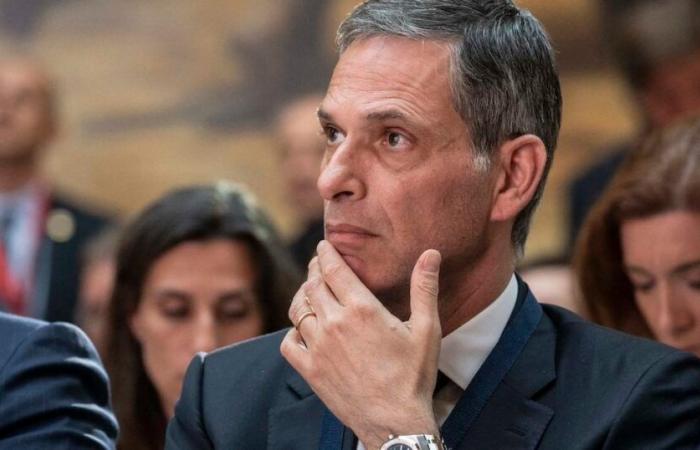
The atmosphere is tense in the BFM editorial staff. According to “Médiapart”, since the takeover of BFMTV by CMA CGM, Rodolphe Saadé's group, concern has spread to the ranks of the 24-hour news channel. Some journalists are warning of interventions perceived as invasive on the part of Nicolas de Tavernost, former boss of M6 and CEO of RMC BFM. Internally, several members of the editorial staff affirm that “the separation between editorial and commercial functions no longer seems to be respected”, a recurring fear since the arrival of the ex-boss of M6. The latter, however, denies any influence on the editorial line, affirming “have no intention of meddling with the content.”
A “more elitist and less popular premium” channel
The takeover gave rise to a wave of departures, around fifteen in total since the opening of the transfer clause on October 1, a clause which allows journalists to leave the company with compensation in the event of a change of shareholder. Historical figures such as Nicolas Marut, senior reporter, or Caroline Hervy, editor-in-chief, have already said goodbye, as have Marc-Olivier Fogiel and Hervé Béroud, who left the channel in September. An internal source underlines in this regard that “management is subject to the clause. They even delayed the opening to avoid it starting this summer in the middle of the transfer window”.
The repositioning of the editorial line is also a point of friction. Because Rodolphe Saadé would have a precise idea behind his head: transform BFMTV into a channel “premium more elitist and less popular”by favoring international news and reducing the space for news items, explains a manager of the channel, adding that the new management also wants to avoid subjects that could “get angry with politicians or advertisers”. This reorientation is supervised by Fabien Namias, ex-LCI, but the precise objectives remain unclear, fueling doubts among the teams.
READ ALSO: “There is no miracle recipe, but we will fight”: Nicolas de Tavernost reveals his strategy for BFMTV to get back in front of CNews
Especially since journalists sometimes feel watched by Benoît Tournebize, former communications director of CMA CGM, although new to the media, who has become deputy general manager. According to an editorial executive, “this man, who is not a journalist and has no experience in the media, has a role that is both central and at the same time poorly defined: he is everywhere. He participates in meetings, hangs out in the editorial office making comments to everyone.” For certain journalists, the omnipresence of Benoît Tournebize, whose role, according to “Médiapart”, consists of “ensure that the interests of the shareholder are understood by all”raises fears of tighter control over BFMTV's editorial choices. Part of the editorial team fears increased interference from shareholders, and independence from certain political leaders also raises questions.
“It’s a way of putting pressure and encouraging us to spare certain political figures”
The recent controversy surrounding a documentary on Rachida Dati illustrates this unease. According to the investigative media, in January, after her appointment as Minister of Culture, BFMTV planned an investigation into her in its magazine “Ligne rouge”. The minister quickly indicated her disagreement and refused to participate. Under pressure to modify the show, Philippe Corbé, editorial director, refuses and threatens to resign. The broadcast of the documentary was then postponed to avoid interference with the electoral calendar, but the investigation was finally scheduled for October 11, without modification. Three days before this date, the absence of a press release questioned the journalists, and they discovered that Nicolas de Tavernost, under pressure from Rachida Dati, would have slowed down its distribution. The leader, who personally knows the politician, disputes this version, “I had absolutely no involvement in it (…) BFM is a completely free antenna”. Since then, Philippe Corbé has left the channel.
The episode is followed by another intervention by Rachida Dati, after criticism from Christophe Barbier during his reappointment in Michel Barnier's government in September, reports “Mediapart”. On set, the editorialist then criticized his record, recalling his legal troubles and his links with Azerbaijan. Rachida Dati reacted immediately and contacted Rodolphe Saadé to express her dissatisfaction, who transmitted his grievances to his representatives within the channel. The minister's remarks thus reach the editorial management. “It's a way of putting pressure and encouraging us to spare certain political figures.”according to a BFMTV journalist.
Certain editorial choices also alerted journalists. On October 16, an interview with Jean-Yves Le Drian is scheduled. The former Minister of Foreign Affairs is today personal representative of the President of the Republic for Lebanon, Rodolphe Saadé's country of origin. But the news of the Lina affair, whose body was found, should have taken over, according to the usual course of BFMTV. But, still according to “Mediapart”, Fabien Namias, after a discussion with Benoît Tournebize, would have maintained the intervention of Jean-Yves Le Drian. Jean-Philippe Baille, information director, denies: “Le Drian was already within our walls when the news about Lina broke. We have largely dealt with the twists and turns in this affair and have taken responsibility for the intervention of Le Drian, who was in the news”.
More recently, the much-noticed invitation from LFI European MP Rima Hassan recently sparked discussions within the Parisian editorial staff. Fabien Namias would have deplored not having been consulted before receiving this figure.so controversial”a decision for which Nicolas Tavernost would have already called him to order. “No, I did not regret or rail against this invitation”clarified Fabien Namias. “I regretted not having had editorial exchanges to participate in the collective reflection on the angles of the interview. Which is part of my job as a journalist.” Faced with these concerns, the management and unions of BFMTV and RMC are currently negotiating an independence charter, guaranteeing that shareholders will not be able to influence editorial choices. For the editorial staff, the challenge is clear: preserve its autonomy and prevent BFMTV from becoming a forum for the political and commercial interests of its owner.





